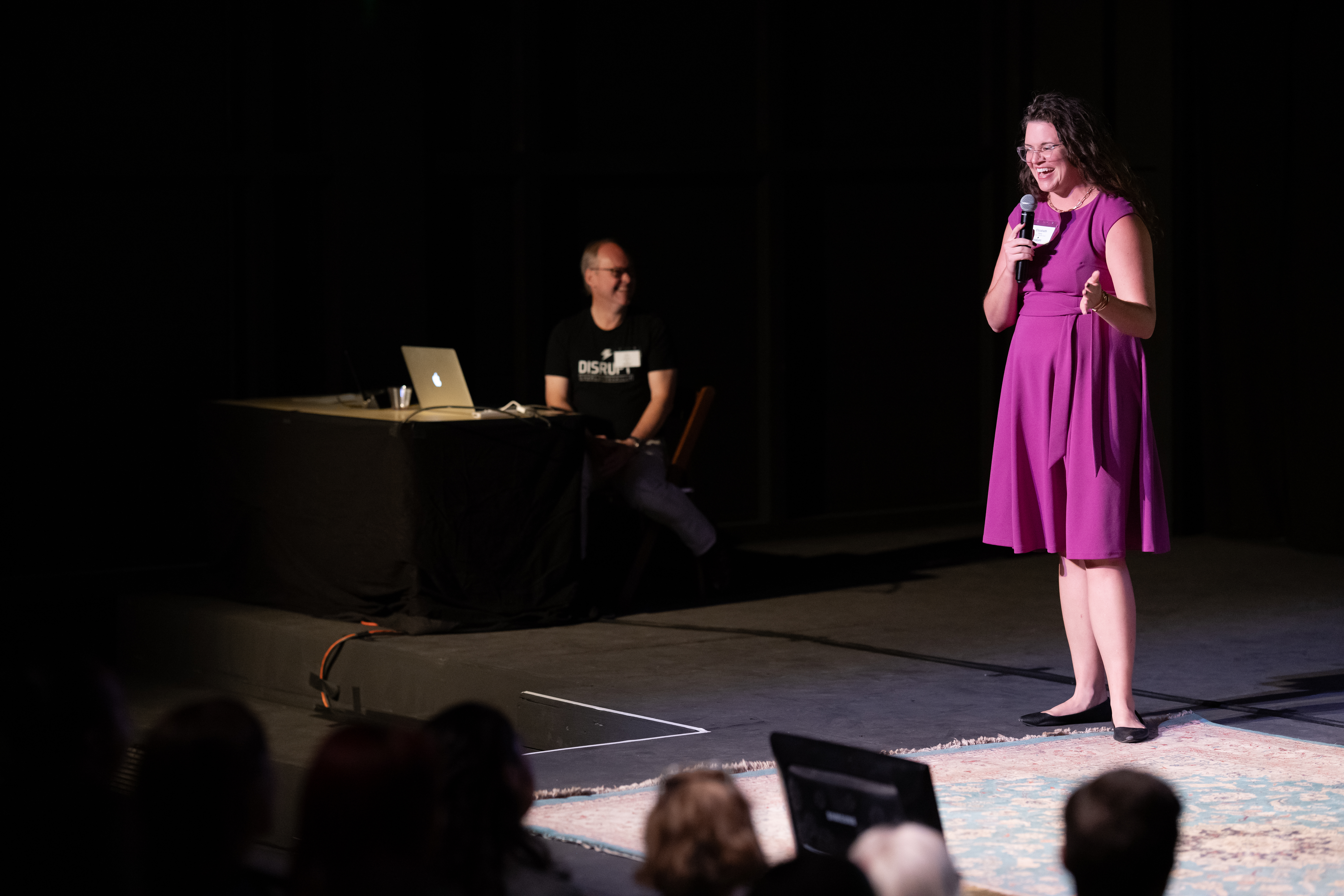Like most of the little girls and boys who took dance classes growing up, the first time I appeared on stage, I was wearing a tutu and tap shoes. After that, my main public performances came in the form of scholastic and academic productions and musicals with my middle and high school theater groups.
In high school, I also got a taste of public speaking in the form of creative writing readings. My fellow writing classmates and I got to read our work in a room, full of peers and parents, sharing the homes, stories, and essays that we poured our hearts and teenage angst into. I really loved those readings in a way that I never loved performing other people’s scripts, probably because I could speak with such sincerity, and so deeply from the heart. I might not be able to relate to Dorothy from The Wizard of Oz or the third extra in Guys and Dolls, but I could certainly relate to whatever imaginative flight or story I told from my own life to a captive audience.
In college, I signed up to work as a peer health educator, which meant I spent a lot of free time visiting groups of students and teaching them topics they were wildly curious about, such as how to drink less and not catch STDs. Again, the public speaking aspect of it was a delight to me. I loved sharing information that felt useful and meaningful to groups of my peers, even if they were only there for the free pizza.
At the end of my college career, I was lucky enough to have multiple opportunities to read my written work and capped it all off by giving the graduation speech at my commencement. I was the student speaker, a.k.a. the valedictorian, even though I didn’t have the highest GPA in class. I got to share the stage with Sandra Day O’Connor and Robert Gates; most importantly, I got to share funny stories, inspiration, and my hopes for the future with my classmates and their loved ones on the eve of our departure into the next chapter of our lives.
Even in my corporate life, I did a lot of speaking. It was my job to support the sales department as a marketing analyst who would give presentations to clients and help paint the picture of why they should buy our specific products. That probably sounds dry, but they were actually very creative, colorful, and multisensory immersive events that allowed me to paint a picture of future scenarios. I articulated what we could expect life to be like in the future, but also tied it back to the product to be relevant to business.
When I struck out on my own as a freelancer and later as a business owner, I made a point to continue offering educational workshops and finding ways that I could get on stage and speak. I performed with a true storytelling group here in town Charlottesville, Virginia, called Big Blue Door, which is an improv and storytelling group that had its genesis and inspiration with the moth in New York City.
I’ve spoken at other conferences and events in the leadership and professional development areas. Through it all, I genuinely enjoy the opportunity to get on stage or upper podium, or stand in front of a classroom and talk to a group of people about a subject that I find interesting and that I know will benefit them.
If you, in the course of your leadership work and professional and creative pursuits, find yourself struggling with public speaking, I thought I would share some of my favorite tips for enjoying this process.
I recognize that the majority of people are actually terrified to speak in public, so I’m a bit of a unicorn when it comes to the fact that I genuinely enjoy it. That’s not to say I never get nervous; it’s just to say that my appetite and enjoyment of the process are much greater than my fear.
So without further ado, here are my five favorite tips for speaking in public and feeling more confident while you do so.
1. Lower your expectations for yourself.
This is probably my favorite tip for every type of personal and professional development because I tend to work with perfectionists and high-achievers like myself who hold ourselves to impossibly high standards, and stress out for no reason when we fail to achieve perfect greatness the first time.
Public speaking is humbling, as is speaking off the cuff and improvising because you’re not going to get it right. There is no right. You’re just talking and can’t consciously moderate every word you’re saying. You want to sound like a normal person and not a robot.
So you’re going to have slip-ups, you’re going to make mistakes, you’re probably going to feel like an idiot for various reasons, and you should just make peace with that ahead of time.
Allow yourself to do a mediocre job instead of an excellent one, and then be pleasantly surprised when you do better than you think.
2. Speak to one person.
It’s easy to get overwhelmed by the feeling of needing to make an impact on various people with different temperaments, interests, and needs. The best way to circumvent this is to stop thinking about the number of people in the room and the individual points of view that may be out there; instead, focus your attention during your writing and delivery on a single person. That person should be the one who you have decided will benefit the most from the information you’re going to share and appreciate your unique communication style and motive delivery more than anybody else.
Choose to talk to someone who is not only your ideal client or your perfect student, but also your biggest fan.
When you walk on stage or step up to the microphone, believe that there is at least one person in the room who will benefit from the time you spend together and the information you share with them, as well as your energy and unique style of delivery. You will take the pressure off of yourself to accommodate a bunch of different points of view, which would never work anyway, and allow yourself to shine by being who you are.
3. Prepare for your comfort level.
Every talk is different, and the length of what you share, as well as the multimedia you incorporate to succeed. Your audiences, visual aids, or understanding of the material will also depend on the venue and circumstance, and type of event that you’re speaking at.
But generally, I find it’s better to prepare for your own level of comfort, rather than what you think will be required by the situation.
If you know you have a hard time speaking off the cuff, create an outline or even a detailed script that you can memorize and practice until it becomes routine. Most of the speeches and talks that you see given by professional public speakers have been honed, edited, and memorized to sound casual. In reality, they are verbatim recitals of something that the speaker knows by heart. These talks may not be verbatim every time; you may be unable to duplicate the original speech word-for-word.
You can depend on a certain level of consistency and do yourself a real favor by mastering certain high points of a talk.
There are things like your introduction, your final statement and the core messages throughout that are key areas for you to memorize so you know you’re hitting the high notes even if you go off the rails a little bit. And again, if it’s a really important talk, that’s all the more reason to write out your speech in advance and practice it so much that you memorize it.
4. Expect to feel nervous beforehand.
In my experience, it is normal to feel somewhat unhinged and nervous before you walk up in front of a crowd to speak. It doesn’t mean that anything is wrong. It doesn’t mean that you don’t know what you’re doing. It doesn’t mean that you’re going to forget everything you’ve memorized. It doesn’t mean that you shouldn’t be speaking in public or that you’re bad at public speaking or any of the other 9000 things you may make it mean.
It simply means that it’s normal to get nervous before you get up on stage and start talking.
I still experience this every single time before I go up and give a talk. It feels like a fight or flight feeling in my body. I may feel a little sick to my stomach. I may feel my heart beat faster. These are all things that I have come to realize are completely fine; they even go away as soon as I start rolling into my speech. When you experience your pre-speaking jitters, do not overthink it. Instead, focus on breathing through it.
There is a wonderful expression that I heard shared from one of my colleagues, a professional speaking coach and mentor named Kate Bennis. She said, “fear is just excitement without the breath,” and I have found that that helpful to remember right before you get up to speak.
You are very likely to feel afraid, and that’s totally fine. If you take some deep breaths and put one foot in front of the other. I guarantee you will move through it.
5. Expect to have fun during and after!
This is probably my favorite hack for genuinely enjoying the public speaking process. When you’re deep in the trenches of writing your speech, you practice it over and over. Then you feel the surge of anxiety and fear that courses through your body before you can get up there and say something. It’s easy to forget why you’re doing any of this, or that it could be fun and magical.
The magic comes from the feeling when you’re in front of a room full of people whose dynamic energy gets to exchange back-and-forth with your own. You get to have a living, breathing experience of connecting with an entire room full of people who, for whatever reason, are choosing to gift you this amount of their time and this sliver of their precious lives. You’ve been charged with making things better for them, and all the legwork has already been done.
All you have to do is show up, then trust in the value of what you are providing and the wisdom you have to share. Then it’s just a matter of opening your mouth and saying the words you’ve already practiced so many times. Luxuriate in that unique energy that only exists briefly for a few moments while you’re up there.
You can practically feel the energy in the room change, especially if you believe in what you’re talking about. When you feel deeply moved by something, you can’t help but move other people.
That connection is priceless, and it takes a lot of preparation and alignment of factors to make it happen. Believe it or not, your talk will be over sooner than you think. So remind yourself of how much fun you will have and that this is a truly unique and one-of-a-kind experience that you’ll never have again in your life.
It’s one of the ultimate ways to feel alive in this moment, knowing that this time will never come again.
Because even if you memorize the speech, give it at the same conference, or say it to the same group of people again, you’re not going to use exact same words and inflections. You’re going to be dressed differently, and so is your audience. All of your life circumstances will have changed and you’ll be meeting each other again as different people sometime in the future.
So for today, you get to live and enjoy the experience of being here in the now.
So there you have it! Those are my five favorite tips for public speaking in a way that actually feels enjoyable.
If you struggle with public speaking, need help crafting speeches, or want to improve your communication, I can help with that. Feel free to comment and let me know where you’re getting stuck.
I hope that you go out there to share your wisdom and your messages in the way only you can. Enjoy that connection you create with other people when you show up and serve from the heart. The world needs you to speak out in the open exactly as you are.





